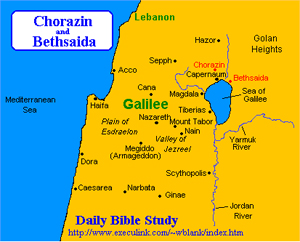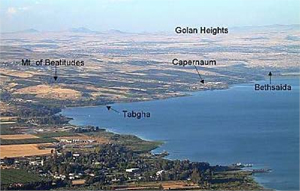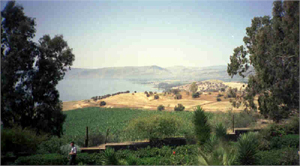
Christmas
Easter
Pentcoest
All Saints
Christ The King
Confirmation
Palm/Passion
Reformation
Stewardship
Books of the Bible
Lenten Series
Christmas Dramas
Videos
Series A - Matthew
Series B - Mark
Series C - Luke
Series D - Other
To contact
Edward F. Markquart
info@sfs.com
| Series B Seed Growing Automatically - Gospel Analysis PENTECOST 2B Mark 4:26-34 SYNOPSIS OF THE FOUR GOSPELS, Kurt Aland, English Edition, p. 118. This Bible study is from THE LIFE OF CHRIST: A Study in the Four Gospels. This free 54 week course for the laity will be available for congregations beginning in 2005. INTRODUCTORY COMMENTSParables are longer stories (a paragraph to a page) about the kingdom. There are about 40 parables of Jesus and we will study most of during this course. Some facts about Jesus’ parables. Parables are:
Setting: Shores of the Sea of Galilee:
http://www.manavai.com/articles/art7.htm
The word, “parable,” means “riddle.” The very nature of a parable is that a person must figure out the meaning of the parable and then apply that meaning to one’s life. For example, the following is a parable: “I like coffee but I don’t like tea. I like Edward but I don’t like Markquart. I like Bill but I don’t like Gates. I like George but I don’t like Stein. I like Marvia but I don’t like Stratis. I like coffee but I don’t like tea.” That is the parable. Can you figure out the meaning of that parable? The explanation? I don’t like anything with the letter, T, in it e.g. tea, Markquart, Gates, Stein, Stratis. The point is: parables are like riddles and you have to figure them out. Of Jesus’ 40 parables, only two of them are explained. You need to figure out the rest. #126. The Parable Of The Mustard Seed Growing Mark 4:26-29 Notice that this parable is found only in Mark. Matthew and Luke, who have copies of Mark’s gospel before them, do not include this parable in their versions. Perhaps they do not include this parable because the parable of the mustard seed will occur shortly, and the parable of the seed growing secretly is quite similar to the parable of the mustard seed. -He also said, "The kingdom of God is as if someone would scatter seed on the ground and would sleep and rise night and day, Circle the words, “kingdom of God,” and write near them, “the central theme of Jesus’ teaching.” The kingdom of God is the reign of God. The kingdom of God is anywhere and everywhere that God’s love, justice, and goodness rule. Do not equate the kingdom of God with the church. It is easy to unconsciously slip into that thought pattern. These are all “kingdom” parables; they are not “church” parables. This parable (and the other similar parables) is about the growth of God’s reign of justice, love and goodness here on the earth. Circle the word, “seed,” and write “the word of God.” The seed is Jesus Christ. The seed is the love of Christ, the spirit and mind of Christ. It is also the Bible, the Living Word of God. -And the seed would sprout and grow, he does not know how. This parable is about the power intrinsic within the seed, the power inherently within the Word of God, within Jesus, within the Bible, the living Word.The Word is alive; it grows. Anything that grows is alive. Centuries ago, you may assume that farmers from a farming generation would understand how seeds grow, but they did not. The growth of seeds was a miracle even then. Today, when farmers plants seeds and seed grows, it is still a miracle. Gardeners feel the same way. When we see the seeds sprout and grow in our gardens, we almost always say, “These flowers are miracles.” So it is with the kingdom of God, the reign of God in our lives. We cannot explain its growth. The growth of love, justice and goodness within an individual or within a society is the result of the power which is in the seed itself. The previous parable about the four soils demonstrated the importance of the quality of the soil. This particular parable demonstrates the power of the seed itself. Both the soil and the seed are enormously important for the seed to grow, flourish and produce much fruit. And Jesus wants much growth, much fruit, much growth in love, justice and goodness. -The earth produces of itself, first the stalk, then the head, then the full grain in the head. A person can easily imagine a seed going through the process, from the beginning seed to the ending harvest. For me, one of the classic interpretations of this Biblical passage about the seed growing automatically (Mark 4:26) was written by Martin Luther when he said about this text: “After I preach my sermon on Sunday, when I return home, I drink my little glass of Wittenberg beer and I just let the gospel run its course.” Luther said that after he pounded on the pulpit and expounded the gospel, he would go home and pull out the Sunday newspaper, and pull out his glass of warm Wittenberg beer and start to drink it and enjoy the afternoon. Luther knew that the power of his sermon was not based on the power of his theological acuity. He knew that the power of his sermon was not based on his eloquence or his abilities. He knew that the power of the sermon would have no effect whatsoever unless the very Word of God got into a person’s heart. Luther knew that he couldn’t do that. It was the Holy Spirit who did that. Luther keenly understood the power of the Word. Focus on Mark 4:26. The kingdom of God, the way of God, the way that God works is this: “If someone would scatter seed on the ground and sleep and rise night and day and night and day. And then the seed would sprout and grow, but he doesn’t know how it happens. The earth produces of itself. The seed produces of itself.” Let’s pause. Focus on the two words, “of itself.” That is the Greek word “automatos,” from which we get our English word, “automatically.” But do you realize where that Greek word, “automatos” is placed in the sentence? At the very beginning of the sentence. For emphasis, the author puts it at the beginning of the sentence. Automatically the seed grows. Automatically, the earth produces. Automatically, the Bible produces. Automatically, the Word gets inside of us. There is something inside the word that changes us. It is Jesus inside the Word that gets through to us. Jesus grows in you, just as seeds grow mysteriously and miraculously. This does not mean that automatically we are going to be Christians. That does not mean that automatically we are going to grow to be a large church. That does not mean that automatically we give our lives to Christ. But what it does mean is that there is power in this Word. As we pick up the Bible and hold it in our hands, we realize that this Word is not passive. There is something in here. If we daily meditate on this Word, it grows in us. That is what Jesus was talking about in this first story. This is a parable of hope. Jesus is saying that the kingdom (God’s rule over the demonic, God’s rule over evil in our lives, God’s rule over the evil in our civilization) is growing and will continue to grow, night and day, year in and year out, century in and century out, through thick and thin, God’s kingly rule is going to grow. Focus on the reign of God and God’s increasing reign on this earth. The reign of God is when God rules over anything and everything to do with the human race e.g. our intelligence, language, technology, medicine, quality of life, and governance of life. Good homes, good family, good jobs, good education, good science, good medicines, good government are all signs of the reign of God. Martin Luther called them the “masks of God.” The Presence of God is living behind these masks of good homes, good families, good schools, good hospitals, good jobs, good government. The Presence of God is found in human civilization, and when our civilization is filled with justice, goodness and peace, we know that this civilization is God’s pleasing. Recorded human history seems to be about 5,000 years old; the human race seems to be about 100,000 years old. It seems that the human race began with living in caves, carving on the walls of caves, and living a primitive community life. Over the past several thousand years, human civilization has developed and grown. Make a hypothetical choice: “Would you like living in the era of primitive human history when human beings were writing on walls in caves or would you like living on this earth today in a civilized society with good homes, good schools, good churches, good jobs, good medicine, good government?” There is no choice. Could this all be part of the story of the growing reign of God within human civilization and within human history? -But when the grain is ripe, at once he goes in with his sickle, because the harvest has come." In all the parables of Jesus, he assumes that there will be an End of human history which is called "the time of the harvest." #128. The Parable Of The Mustard Seed Matthew 13:31-32, Mark 4:30-32, Luke 13:18-19 Remember that only two of the parables of Jesus have explanations. The rest of the thirty-eight parables offer no explanation and a listener has to ponder the parable and attempt to decipher the meaning and the message for one’s life. Notice that Luke has a different location for this parable and the next parable. -He also said, "With what can we compare the kingdom of God, or what parable will we use for it? Highlight. This is another kingdom parable, telling us about the reign of God. Whenever and wherever God rules, that means there will be love, justice and goodness. As a consequence of love, justice and goodness, there will be peace. -It is like a mustard seed, which, when sown upon the ground, is the smallest of all the seeds on earth; yet when it is sown it grows up and becomes the greatest of all shrubs, and puts forth large branches, so that the birds of the air can make nests in its shade." The message and meaning of the parable is this: There is an incredible growth of God’s reign in the world. We can talk about the incredible growth of God’s reign in a person’s life, in our own lives. The focus of the parable is growth, explosive growth, enormous growth. Each parable has a unique contribution to make to our understanding of the reign of God, and this parable focuses on the incredible growth that is part of the reign of God. We recall Jesus’ other teachings about producing much fruit. Not a little fruit but MUCH fruit. We recall Jesus’ other teachings about soil that produces thirty, sixty and a hundred fold. Jesus had this vision that there would be ENORMOUS, MIRACULOUS GROWTH in God’s rule of love, justice and goodness throughout the world. Many scholars apply this parable to the church. That is, the church grew from one person (Jesus) to the twelve disciples and today the church numbers in the billions of people who claim Jesus Christ as their Lord and Savior. But this parable is not primarily about church growth but is about growth of the kingdom of God and the phenomenal growth of the rule of God in this world. This parable of the mustard seed belongs with the next parable in Matthew’s gospel about the leaven. “These two parables are parallel in structure. Both begin with the introductory question by Jesus. Both contrast the small beginning of the kingdom with its grand scope at the end of the age … What begins in a humble fashion will give way in time and through a mysterious process to a far greater and more encompassing reality. … In neither parable does the human observer cause the growth.” CONCORDIA COMMENTARY, Arthur Just. One interesting interpretation and application of this parable is that the seed of democracy was planted in the Magna Carta in 1205. The Magna Carta was the first time in literature that a restraint was placed on the king. As we recall, Archbishop Stephen Langton was the person who helped author the Magna Carta and was also the scholar who first put “chapters” into the Bible. The point is, the concept of democracy has grown enormously during these past eight hundred years, and is now the finest possibility for political governance. The number of democratic nations has also expanded during these past eight hundred years. _______________________________________________________________________________ #130. Jesus' Use of Parables Matthew 13:34-35, Mark 4:33-34 -All this he said to the crowds in parables. We are again reminded that most of the crowds may not have comprehended his parables. -Indeed, he said nothing to them (the crowds) without a parable. This shows that Jesus truly loved the form of parables. He could draw the people in the crowds into his stories and they would begin to wonder about the meaning of his clever and ingenious stories to them. Jesus spoke to the crowds so they would hear the gospel and figure out the meaning of the parables and apply those parables to their own lives. In time, some of them would become disciples. -He explained everything privately to his own disciples. That is what we are doing in this class together. Jesus is still explaining the meaning of his stories to his own disciples. We read books about the parables; we listen to each other and what each of us ascertains is the meaning of the parable; we listen to the rabbi of the class tell us what he or she thinks the parables mean. Today, Jesus is still teaching his disciples the meaning of his riddles about the reign of God in our lives.
Please read the following sermon which is based on this text. Pentecost 2
|


